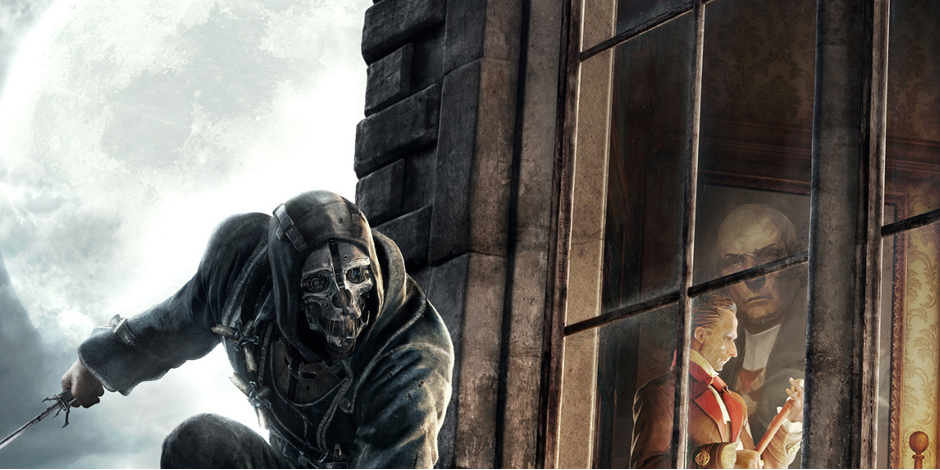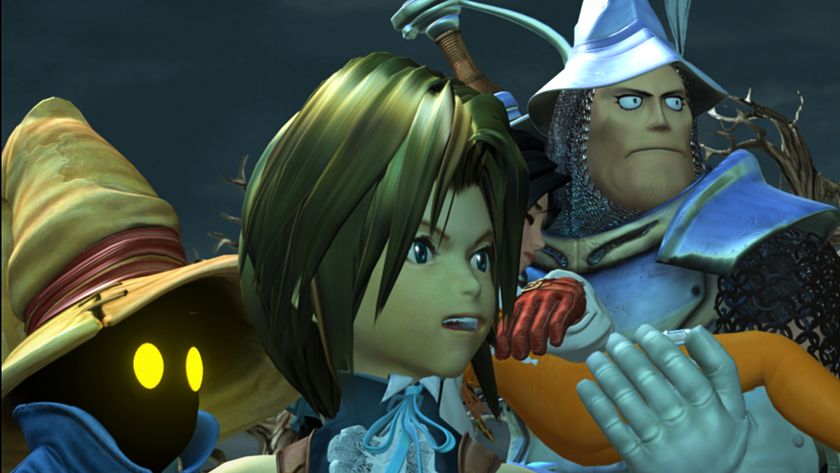12DOVE Verdict
Pros
- +
Openness of the level structure
- +
Freedom to be creative with the combat
- +
Unique lore and characters suck you into the world
Cons
- -
Abilities wheel and onscreen pop-ups take you out of the action
- -
Steep difficulty at the start can be discouraging
- -
Stealth option gets trumped by action gameplay
Why you can trust 12DOVE
Editor's Note 4/19/13: Scroll down for GamesRadar's review of Dishonored's DLC update, The Knife of Dunwall.
Historically, new IPs with unique worlds don't pop up as frequently when it's several years into a console cycle. But with Arkane Studios’ Dishonored, the first-person, stealth-action title sneaks in, like its hero, and catches you completely off-guard with its overall quality. Dishonored arrives with a unique world filled with fascinating characters and intensely entertaining stealth-based combat. This strong core is topped off with the inclusion of player choice and the ability to create your own path in the world, making a thoroughly satisfying experience.
You play as Corvo Attano, the famed Lord Protector of the Empress of Dunwall. The city has seen better times, and is afflicted with an infectious rat plague that’s turning the citizens into zombie-like, blood-crying Weepers. Upon returning from an assignment to find a cure for the plague in a neighboring empire, Corvo witnesses the Empress’s assassination and kidnapping of the Empress’s daughter, Emily, and is rendered helpless. He is quickly accused of regicide by the true perpetrator and self-proclaimed Lord Regent (Hiram Burrows). But with the help of an underground resistance group, Corvo escapes captivity, meets with the band of loyalists and, begins setting plans in motion to rescue Emily and enact revenge on those responsible.
Players receive missions from the Hound Pits, the Loyalists's home base. From here, you’ll head to an open mission area by boat where you can gather details on your target, discover secret paths, and decide what course of action you’ll take. Every target can be assassinated, but with additional effort, each one can be neutralized through unique, non-lethal means. So, instead of simply stabbing them in the neck, you can manipulate situations to get the target banished, humiliated, or even kidnapped by a “secret admirer.” It is incredibly rewarding to successfully complete the optional side missions required to pull off the non-lethal solution. You’ll learn everything there is to know about the dense world lore and the interesting target characters--like their motivations, and personalities--through journals, voice recordings and NPC gossip. Then, once you find out how horrible of a person the targets are, you’ll feel satisfied when you give them a punishment that’s (in most cases) much worse than death.
"...filled with fascinating characters and intensely entertaining stealth-based combat."
The entire world setting immerses you in the story and creates motivation for you to rid Dunwall of it’s corrupt political figures. You explore the visually striking, Victorian-inspired city, covered in graffiti--protesting the oppressive overlord. Plagued corpses lie on sidewalks and fill rotting apartment buildings. The characters are believable, intriguing, and unpredictable--forcing you to consider the fate of every prominent character, even the Average Joe security guard. Every mission environment feels different from the last, ranging from dank, underground sewers and long abandoned whale oil factories to royal mansions and exclusive burlesque houses. But Dishonored truly excels at pulling you in with its integration of player choice.
The story maintains its intrigue by showing how your actions impact the game world. Whether you choose to assassinate or spare a target, your number of kills, or the more you make your presence known to your enemies, they all increase the world’s chaos rating. Doing less desirable actions makes Dunwall a drearier place, giving true weight to your choices. A high chaos rating fills the streets with additional weepers and rats, but it also has a psychological impact on your companions and their attitudes toward you. You can be seen as a ruthless killer, or a merciful savior, making the story all the more engrossing as you see the impact you are making.
Corvo has a variety of weapons and abilities at his disposal. Assassin-style weapons like his retractable short sword and one-handed crossbow make up his standard arsenal, but he also has access to supernatural abilities--bestowed upon Corvo by the celestial Outsider--that allow him to transport himself short distances, summon rats, and freeze time. Each of these abilities are earned and upgraded by collecting runes, and Corvo can get minor bonuses from finding and equipping bone charms. Collecting the runes and bone charms encourages exploration, but it can become annoying when the on-screen pop-ups continuously remind you to upgrade and force you to enter the menus to get rid of them.
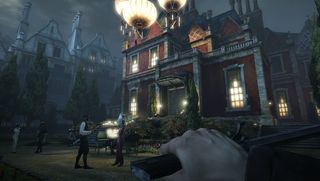
"The story maintains its intrigue by showing how your actions impact the game world."
Although Dishonored has a sequential level structure, the missions are far from linear. The way you approach a goal is completely up to you. If you're interested in action and gruesome kills, you can charge through guards with adrenaline fueled melee kills, explosive grenades, and Jedi-like force pushes. Or you may decide to get creative by combining your weapons and abilities to almost absurd levels, which is incredibly amusing. You can summon a horde of rats, freeze time, attach a spring razor (proximity mine) to a rat, possess the rat, then walk it over to a guard, the spring razor will release, shredding the guard to meaty chunks. The multiple combat options allow you to play your own way while making you feel like a powerful super-ninja, but ability limitations and powerful enemies ensure missions won’t be a walk in the park.
Unfortunately, starting off with limited abilities and weapons in the beginning of the game might leave a bad taste for some players. Some of the earlier challenges are abnormally difficult, simply because you don’t have to abilities like Time Bend or Rat Swarm to help you get out of sticky situations. Without the more powerful skills, your success will be more dependent on trial and error, which can become discouraging.
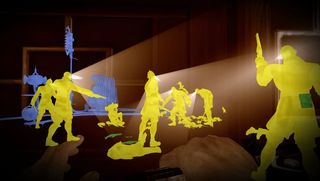
"Dishonored is a game that you won’t want to miss."
Alternatively, you can completely “ghost” a level, leaving none the wiser to you ever being there. But, taking the stealth route is boring compared to more violent methods. You can find clever ways to circumnavigate enemy guard positions and find hidden paths in the nooks and crannies of the environment, but you’ll also have to forgo the system of combining the weapons and abilities we mentioned before. The fun-factor of patiently hiding in the shadows pales in comparison to dismembering adversaries with magic powers or sticking your retractable blade through an enemy’s chin. However, the alternate outcomes and multiple story endings lend themself well to more than one playthrough. So, getting your bloody rampage fix on the first run may inspire you to make the next pass a bit more subtle.
Dishonored combines a beautiful, stylized world filled with colorful characters, and gameplay freedom to form a fantastic adventure that you will want to revisit again and again. The open-style missions--combined with the weapons and abilities--make a thrilling playground to explore, tough enemies present a significant challenge, and the multiple outcomes, characters, and setting create an exhilarating world to discover. Dishonored is a game that you won’t want to miss.
Dishonored: The Knife of Dunwall DLC review
Corvo Attano's story is done, but there are still other tales to be told from the city of Dunwall. Dishonored's first DLC offering, The Knife of Dunwall, is set immediately after the assassination of the empress at the beginning of the original game and puts you in the role of Daud, the leader of the assassin order called The Whalers. The DLC takes you through three challenging missions, gives you access to new powers, and lets you dive deeper into the lore of Dishonored. And guess what? Those additional missions are absolutely worth your time.
The Knife of Dunwall gives you more insight into the mind of the master assassin in the first part of a two-part story. Daud's struggle with guilt over the murder of the empress and the downfall of Dunwall, as well as his subsequent path to redemption, is a compelling setup. But with the story being broken up into two parts, the story feels like it's just that; a full story that has been chopped in half. That is to say, the intriguing introduction to the bad guy ends incredibly abruptly with a weak twist.
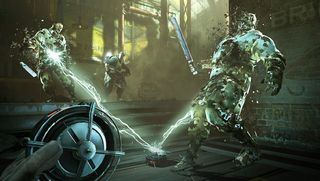
"Those additional missions are absolutely worth your time."
Some of the environments are particularly striking. For instance, the first level takes you through a whale oil factory that contains butchers torturing civilians and a massive whale being drained of its valuable fluids, while it's still alive. The corrupt moments you witness drive home the concept of Daud's guilt and opens up the character as more than just a heartless murderer.
Outside the underwhelming ending, the DLC maintains the excellent stealth-action gameplay of the original, and gives you a few twists on the classic powers to experiment with. The levels are as challenging as ever, with multiple options in terms of the path you take to your target and whether you eliminate them lethally or just ruin their lives. You'll also get a chance to explore more of the corrupt city's underbelly, both in the environments and in the diaries, books, and notes you find.
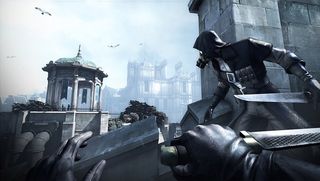
"...you'll have to wait for part two to see if Daud's tale will be a full, compelling story."
Daud's alternate weapons and powers give players a few less options than what Corvo had and your abilities rely more on distraction than straight stealth tactics. The original rat summoning power now calls a helpful assassin to your side, possession is completely missing, and you now have enemy-stunning Chokedust grenades at your disposal. These options give you fewer avenues to be stealthy and creative with kills, since tactics like possessing enemies and walking them into deathtraps is impossible. However, the core gameplay is still strong, even if Daud's abilities lean more towards the Chaos path.
Dishonored: The Knife of Dunwall is an entertaining experience from a gameplay standpoint. It hits the highpoints of the original game as you carefully ghost through the environments or brutally assassinate everyone you see. If you're looking for more of Dishonored's stealth-action gameplay, The Knife of Dunwall will definitely scratch the itch, but you'll have to wait for part two to see if Daud's tale will be a full, compelling story.
Our Verdict: Buy it
More info
| Genre | Action |
| Description | In this upcoming steampunk inspired first person shooter, take on the role of Corvo Atano, a once trusted bodyguard of the Empress. When framed for her murder, he decides to seek revenge and become a famous assassin. |
| Platform | "PS3","PC","Xbox 360" |
| US censor rating | "Mature","Mature","Mature" |
| UK censor rating | "","","" |
| Release date | 1 January 1970 (US), 1 January 1970 (UK) |
Many years ago, Lorenzo Veloria was a Senior Editor here at 12DOVE helping to shape content strategy. Since then, Lorenzo has shifted his attention to Future Plc's broader video game portfolio, working as a Senior Brand Marketing Manager to oversee the development of advertising pitches and marketing strategies for the department. He might not have all that much time to write about games anymore, but he's still focused on making sure the latest and greatest end up in front of your eyes one way or another.
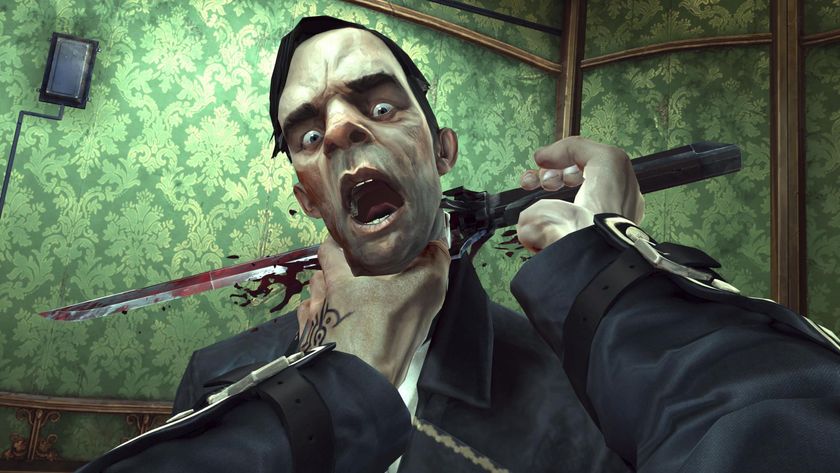
Dishonored creator's Fallout: New Vegas-inspired immersive sim prefers stylized art to ultra-realism that ages fast – "Back then it was probably stunning, now you can't even look at it"
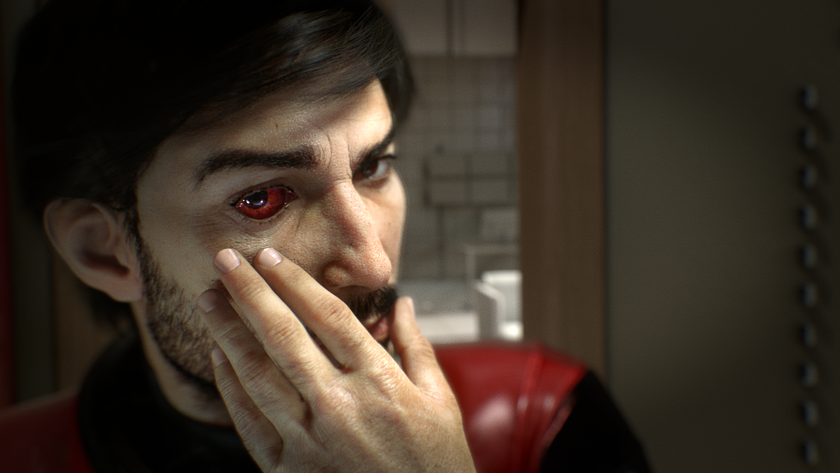
"We're brothers": Dishonored and Prey director reflects on 20 years at Arkane as he unveils his new RPG-infused immersive sim
